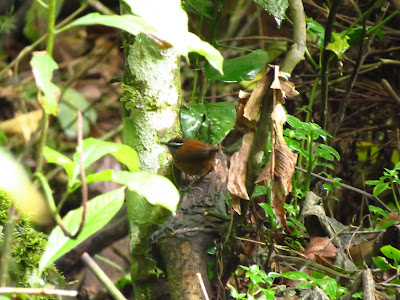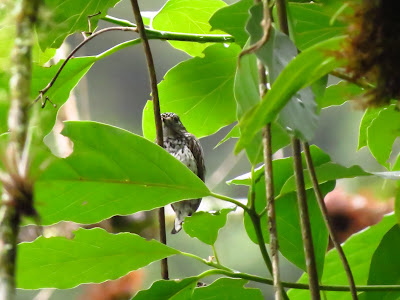June
11th,
2018
Warm,
Cloudy morning some light rain in the early morning and later in the
afternoon
Breakfast
is taken on the top floor of my Bed & Breakfast, a simple meal of
bread rolls with margarine and jam with strong Peruvian coffee and a
glass of fresh pineapple juice. Maria, the owner of the establishment
is friendly.
Crossing
one of the bridges that traverse the small stream that comes down
from the hot water springs, two White-capped Dippers stop me for a
while. Beautiful, small dippers that have very prominent white caps,
they don't enter the water as frequently as European counterparts do.
Instead they feed on the water splashed edges of rocks and find food
items there. Upstream I know of the hot water springs having swam in
them back in 2014 with my daughter, Rebecca. The water is really hot
in the swimming pools built there but if you ever go, don't make the
mistake of jumping into the cloudy, steaming water as the floor of
each pool is quite sharp gravel.
I
make my way along the edge of the artisan market, where stall owners
are removing shutters preparing for the arrival of the first tourist
train from Cusco. There are around a hundred or so stalls and each
seems to me to sell much the same items; t-shirts, colourfully
striped alpaca wool garments, ornaments of various sorts and large
alpaca wool blankets of various Incan designs. I always wonder how
each stall owner, always a woman or so it seems, makes a living with
so much competition around them and how the tourists decide upon
which stall to purchase from. That they do is evident by their
presence and it makes a colourful, claustrophobic welcome when one
arrives off the train and negotiates the narrow corridors to access
the town.
I
stop on a wooden bridge where a small stream goes down the hill
towards the almost dry river bed. Upstream of the town there is a
hydro electric plant and it has a large sluice system that is
stopping the water of the river from coming down to here at the rate
that it was flowing upstream. Now, in the middle of the dry season,
the river is low and relatively quiet. I have been here in the middle
of the Peruvian summer, in January when the river is anything but
quiet. Don't get a hotel or hostel at that time of year because the
violent raging torrent that smashes downstream is cacophonous and you
won't get a wink of sleep. Believe me. I made that mistake last year!
A
circling Black-breasted Buzzard eagle is high over the adjacent
mountain top and a male Andean Cock of the Rock flies down the small
valley and lands in a tree nearby. A splash of brilliant red, the
bird makes it a lovely start to the day. The Inkaterra guard on the
far side of the bridge, Hose, hears my plea and I go to the famous
hotel's office to ask whether I can bird the garden for the morning.
A Dusky
Green Oropendula
welcomes me with it's bubbly song and a flock of around twenty Mitred
Parakeets lands atop a tall tree, immediately disappearing into the
dense foliage. Once inside with permission given, I pass a place
where a number of open bananas have been skewered onto sharpened
twigs and a number of birds are feeding. Mostly Blue & Gray
Tanagers, there are also other birds that are new for the Green
Birding year list. In quick succession Blue-necked
and Palm
Tanagers,
Thick-billed
Euphonias
and Blue
Dachnis
are all added to the list.
The blue on the head of the tanager
doesn't match the deep blue on the male dachnis but they all make a
marvellous movement of colour as they feed or behave aggressively
towards each other. There is a definite pecking order with the larger
Palm Tanager seeming to always take precedence over the other tanager
species and they in turn chase away the dachnis and euphonias.
I
go to the swimming pool and hot tub area and find a Chestnut-fronted
Coronet
sitting on a small twig a foot away from a hummingbird feeder. My
fiend, Jason Oliver and I, sat here last year and observed the same
species doing just this last year. I wonder if it is the same bird. I
name him Sid as I always do with pets. I have a pet rock back at Mum
and Dad's in England, a rock that I have had as a pet since 1990. Sid
the rock is from the Pyrenees in France. At Gavarnie there is a high
cascade, the highest waterfall in Europe and when I had driven there
in the summer of 1990 with a wonderful girlfriend named Diane, I
found Sid bemoaning the fact that he was fed up of the water falling
on him! I rescued him bravely and took him home. Taking Sid into the
Primary school, Merridale, in the autumn, where I was a teacher at
the time, the Year 3 children totally believed the story of how I
found Sid and why I bought him home. The perfect pet, Sid stayed
still, didn't need feeding and never poohed or weed anywhere. He
never did chase sticks though! In 2009 I returned there, to that
wonderful Cirque de Gavarnie and found Sid's wife and children. They
all now reside in the garden of my parents.
I
continue to the next pair of hummingbird feeders and sit on the
spectator benches and watch as a procession of hummers arrive to sip
the sweet liquid. The majority are Chestnut-fronted Coronets, seven
or eight of them but occasionally Lesser
Violetear,
Green & White Hummingbirds and tiny Booted
Raquet-tail
get a look in. The Lesser Violetear always arrives with a quick
raspberry call announcement.
Walking
past the orchid garden and the tea house along a well maintained
pathway, I reach the area where Inkaterra grow their own tea and
coffee. Here a Gray-breasted
Wood Wren
shows itself nicely as a couple of Brown-capped
Vireos
and
a single Red-eyed do their best to hide in the leaves of the canopy,
as does a Beryl-spangled
Tanager.
High in the canopy there are a number of quick moving tyrannulets and
I struggle to get good views of any of them. A Mottle-cheeked
Tyrannulet
takes pity on me. An Occelated
Piculet,
a diminutive woodpecker species, is more obliging as it goes down the
tiniest of vertical twigs and a Yellow-browed
Tody-flycatcher
shows itself high in the canopy of a tall tree. I can hear a
White-tipped Doves low repeated call and coming around a corner there
it is walking on the path.
The
pathway has a section where one can view the river and a pair of
Torrent Ducks are sitting on some exposed rocks nearby. Twenty or so
Blue & White Swallows are skimming the water. A little further
along an Azara's Spinetail tries to stay hidden in some thick
vegetation but shows warm chestnut crown and wing patches and long
greyish tail and underparts.
It
is here that I meet Carmen, the Inkaterra orchid expert and we walk
slowly around the gardens for the next two hours. Carmen has been
working at Inkaterra for over eighteen years and she has a phenomenal
knowledge of the plants and creatures that frequent the beautiful
gardens. Carmen shows me a variety of orchids, some that I would
never have guessed to be orchids. Some look like ferns, others have
miniscule flowers and a few are the showy, spectacularly shaped
orchids that I am more familiar with.
Carmen takes me to the Spectacled
Bear enclosures where Inkaterra is trying to rehabilitate a few to
populate a reserve nearby. The sad looking, beautiful, large bears
have been rescued from circuses in Peru and the male was made to
dance for his supper when captive. He loves avocados but Carmen wants
him to slim down a tad and hence alfalfa and fruit is provided. The
food has been placed on high platforms so that the lazy bear has to
climb in order to get it. Tanagers are enjoying the fruit he hasn't
got to yet and Golden-naped,
Saffron-crowned
and Silver-backed
Tanagers
are added to the, at last, growing year list.
Carmen
and I walk back to the hummingbird feeders just as a superb Collared
Inca
arrives. It is soon chased off by the speedy Chestnut-fronted
Coronets but not before I see what must be my favourite hummer.
Whilst we sit and talk a small hummingbird arrives that is a lifer
for me, a Speckled Hummingbird and at one stage four species of
hummingbird are sharing the platform.
Leaving
Inkaterra for some lunch I stop on the bridge and see a pair of
Torrent
Tyrannulets feeding
a juvenile on the rocks beside the stream. Small balls of grey and
smudgy black, I had forgotten how tiny these birds were.
Lunch
is taken in the market where an old lady in a corner is selling
plates of corn on the cob with thick sliced fried potato, which back
when I was a child was called scallops at my local fish and chip
shop, with chunks of some sort of meat. I sit with half a dozen
Peruvians enjoying the same. The cost is five Soles, around £1.50.
I
then go to buy my ticket for Machu Picchu. Once I have my passport,
retrieved from my bedroom I buy the ticket for noon tomorrow and am
told that It allows me access to the World Heritage site for four
hours.
Shattered
still from yesterday's twenty six mile walk and with my thighs still
painful on each side where the muscle joins the side of each knee, I
go back to my room and relax. I soon fall asleep! On waking I spend
my evening on the internet in an internet shop with all of it's usual
cubicles and ancient machines. The other computers are being used by
very loud Peruvian teenagers playing various, mostly violent computer
games.
Green
Year list : 248 birds
average new birds to list per day : 3.44 birds
average new birds to list per day : 3.44 birds
altitude
: 7,504 feet























No comments:
Post a Comment